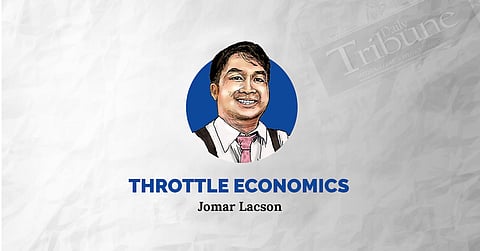
- NEWS
- the EDIT
- COMMENTARY
- BUSINESS
- LIFE
- SHOW
- ACTION
- GLOBAL GOALS
- SNAPS
- DYARYO TIRADA
- MORE

“There is no instance of a nation benefiting from prolonged warfare.” These wise words from Sun Tzu are quoted in every general’s bible, the Art of War. Unfortunately, prolonged warfare seems to be an emerging scenario in the global trade situation.
To recall, US President Donald Trump escalated the trade conflict in April 2025 during his self-declared Liberation Day.
Reciprocal tariffs were applied to countries that had a trade surplus with the United States and in a tit-for-tat with its major trading partner, China, the trade tariffs amounted to an eye-popping 145 percent.
Over the past eight weeks, however, the situation has de-escalated with exemptions, deals, and postponements.
While markets remained wary of the trade situation, investors were beginning to interpret Liberation Day as one gigantic deal-making exercise.
CNN reported on a new term, TACO (Trump Always Chickens Out), as coined by a Financial Times columnist, which means that investors and traders should not be overly concerned about the tariffs because Trump is likely to back down.
What markets were not expecting and not yet fully appreciating is that the legal dimension of the tariffs has now pushed the situation’s duration further out.
This week, the US International Court of International Trade (USICT) ruled that President Trump lacked the authority to impose reciprocal tariffs.
You see, the reciprocal tariffs were based on a 1977 law called the International Emergency Economic Powers Act (IEEPA) as Trump cited the fentanyl drug crisis and trade deficits as the catalysts for the policy.
The USICT, however, ruled that the reciprocal tariffs should be based on another law, the 1974 Trade Act, which allows the US President to respond to a balance-of-payments crisis.
While this may seem like a positive development because the reciprocal tariffs have been put on hold, it actually is quite the opposite for markets.
Sun Tzu has also been quoted with this advice, “In war, let your great object be victory, and not lengthy campaigns.” This development ensures that it will be a lengthy campaign.
While the US Trade Act does grant the US President the power to hike tariffs and impose levies on trading partners, this is conditional with requirements that include public notice, a comment period, and an extensive investigation.
If there are disputes, they will eventually be elevated to the US Supreme Court. The process can be quite lengthy.
Since he initiated the trade offensive, Trump will have to weigh his options.
To pursue the trade and tariff strategy knowing the legal vulnerability weakens his bargaining hand and could result in prolonged negotiation with trade partners; or to search for other levers to achieve the greater objective?
Are tariffs the only tools in his arsenal against the threats, perceived or real, that he has outlined in his election campaign? He can also take a step back and try a more moderate or diplomatic approach but given TACO and the signals it gives to other global players, this would not be an optimal approach.
The conclusion is that markets will have to brace themselves for new tactics and/or prolonged uncertainty. Businessmen and consumers may feel relieved that the inflationary effect of these tariffs are unlikely going to be felt over the next few months.
However, the goals of the Trump administration have not changed. If the US were to follow Sun Tzu’s wisdom and be more creative, investors should not be surprised if tariffs were just the start and there are more surprises in store in 2025.
